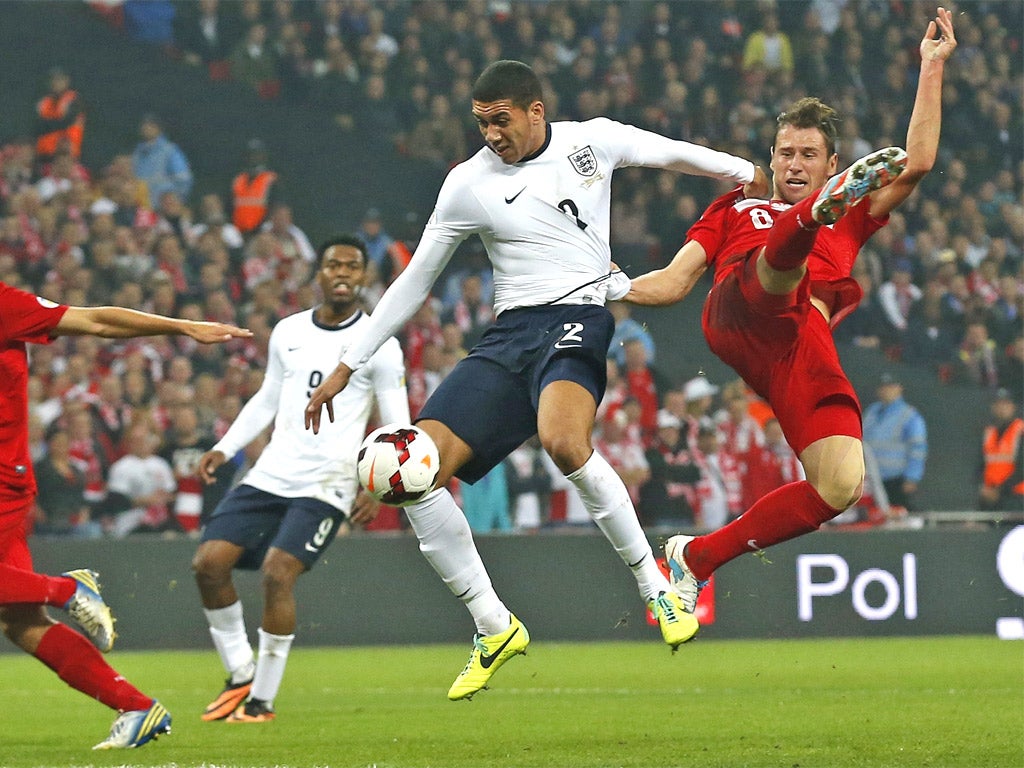England 2 Poland 0 analysis: Chris Smalling proved he is not an international full-back
Five things we learned from Wembley win

1. A foreign takeover of Wembley can actually be a good thing
If it was not obvious before, everyone could tell when an offside Waldemar Sobota beat Joe Hart in the final minutes before the interval and nearly half the ground went up. There were far more than 20,000 Poland fans in the south-east corner. There must have been nearly double that, spread throughout the home fans.
But the Football Association's relaxed approach to segregation in order to create an atmosphere paid off. This was one of the more memorable Wembley nights, and the England players looked far more comfortable in this real football atmosphere than they do in Wembley's occasionally odd, anxious silences.
2. Michael Carrick's midfield presence gives England more zip
Just as the decision to pick Andros Townsend was vindicated on Friday with a goal, so was Roy Hodgson's choice of Michael Carrick against the Poles. Carrick's brisk passing helped give England more tempo in midfield than they often have, not least for the opening goal, when his first-time, left-footed ball to Leighton Baines in space gave the full-back a chance to cross to Wayne Rooney before Poland's defence had a chance to reorganise.
The only problem was that Carrick's fading influence in the second half meant that Frank Lampard was brought on to replace him as England tried to close out the final 20 minutes.
3. Chris Smalling is definitely not an international full-back
While the selection of Carrick was justified, Hodgson's other decision – Chris Smalling over Phil Jones at right-back – was not such an obvious success. Smalling, in his defence, is not a specialist right-back, and he was never going to be as comfortable as Glen Johnson or Kyle Walker, but England were left short by their absences in both attack and defence.
Smalling did not have the pace or the instincts to be an overlapping threat down the right flank, limiting England's attacking options. At the back, he was pulled out of position and beaten more than once by Sobota. Johnson and Walker will be welcomed back.
4. Robert Lewandowski would have lit up the Premier League
His decision is understandable, but what a shame for the Premier League that Robert Lewandowski is likely to join Bayern Munich in the summer. He showed again just how dangerous he is, with speed of movement that desperately worried England throughout.
Twice in the first half he broke up the pitch from England corners, once carrying the ball 70 yards, the other skewing agonisingly wide with his left foot. In the second half, he forced Phil Jagielka into one desperate clearance after Joe Hart had charged out and was very unluckily penalised when through. Everyone knows what he can do with better team-mates.
5. Steven Gerrard's ability to play to the occasion has not dimmed
If the last few years of Steven Gerrard have felt like a low-key fading from the brilliance of his twenties, he reminded everyone here of his ability to bend the very biggest occasions his way. To score such a brilliant and individual goal, storming through tackles before lifting the ball over Wojciech Szczesny, in the penultimate minute of the final World Cup qualifier, to seal qualification, and doing so as captain, must be one of the most Gerrardian moments of his entire career. If there had been a gap in his international achievements, there is not one any more.
Join our commenting forum
Join thought-provoking conversations, follow other Independent readers and see their replies
Comments
Bookmark popover
Removed from bookmarks